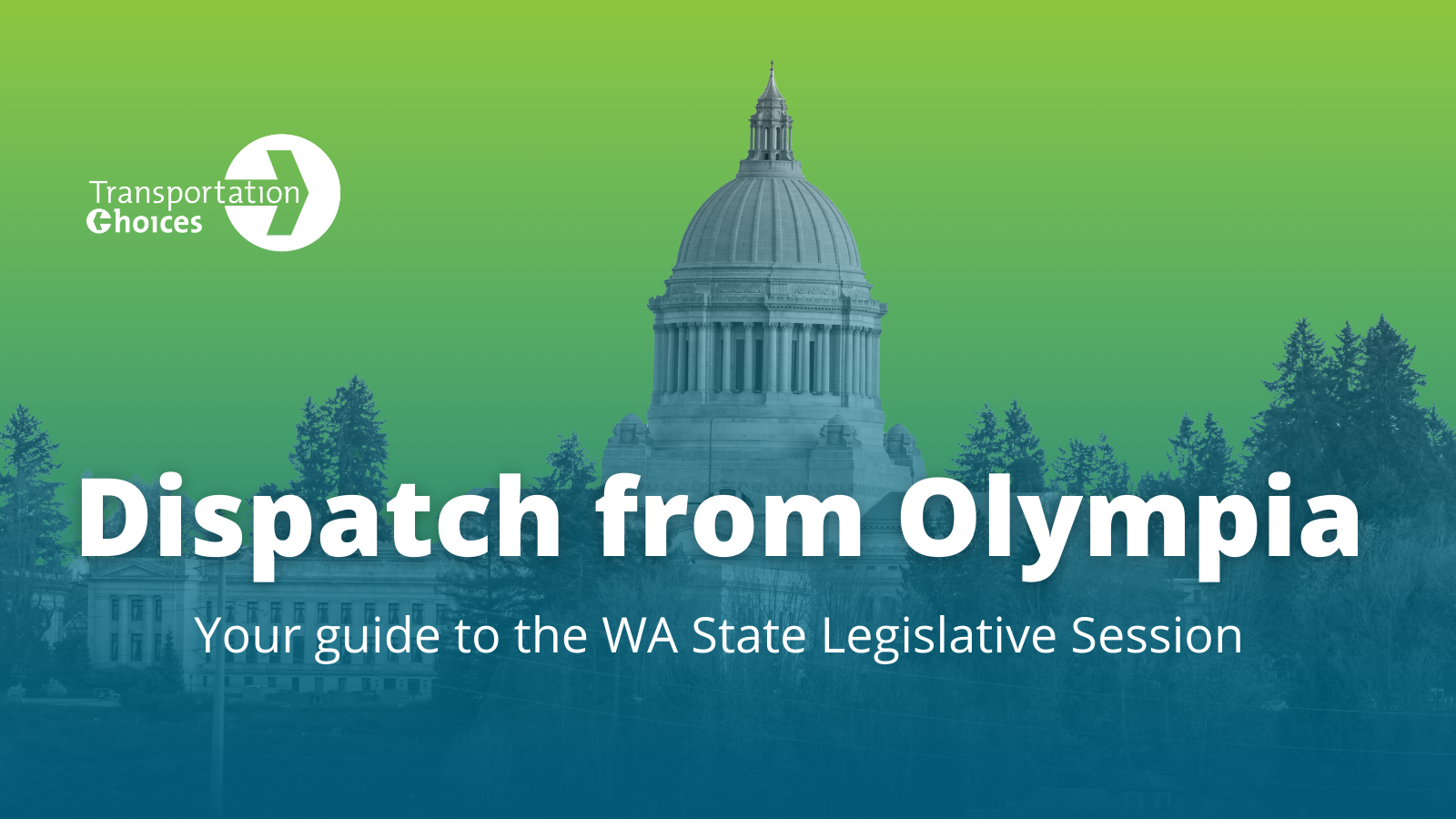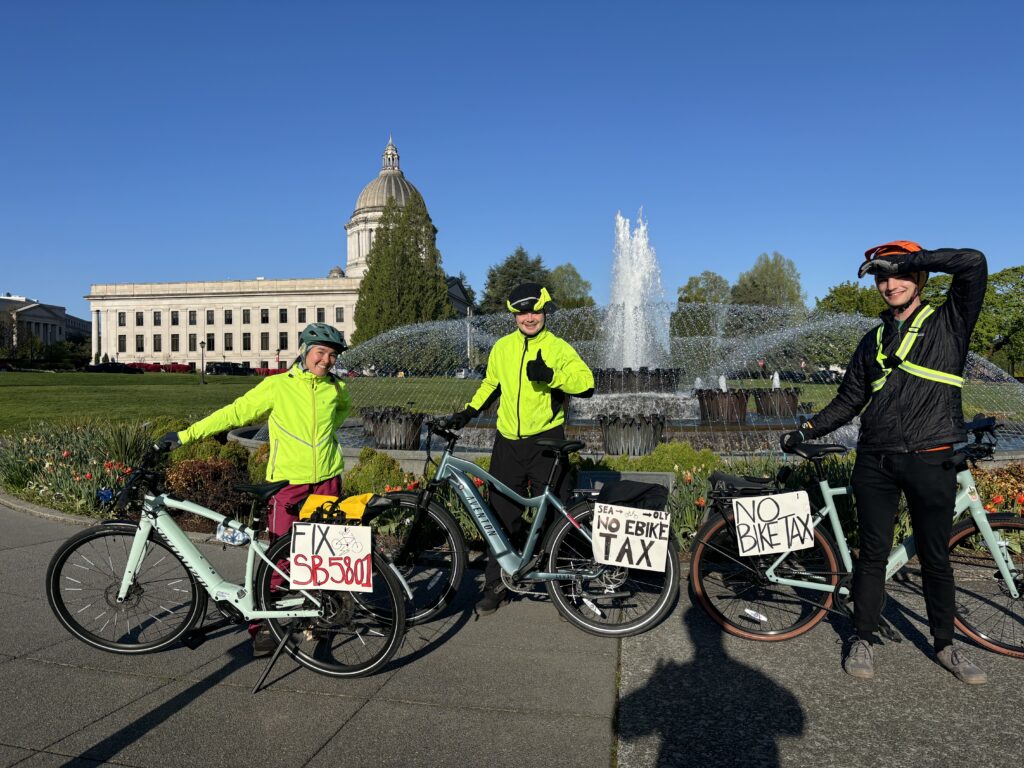
Dear friends,
After four long months, legislators closed the books on the 2025 Washington State Legislative Session yesterday. So, how did everything turn out for transportation?
It was a challenging year for legislators. On top of a deficit in the operating budget, they faced an $8 billion shortfall over 6 years in the transportation budget. This meant creating new revenue, as well as delaying some planned projects. At times, we feared big cuts were coming to the programs we care most about, but in the end we were able to preserve most funding for transit, walking, and biking, stop new taxes on e-bikes and buses, and even win exciting new investments in future years.
Read on for more details about the transportation budget, and the wins we’re celebrating!
Big Picture Budget Takeaways
To balance the transportation budget, legislators combined existing revenue sources and new revenue sources, including a 6-cent gas tax increase and a luxury taxes on vehicles worth over $100,000 and aircraft worth over $500,000. They also delayed some planned highway projects, and didn’t fund new projects in the short term. There’s still too much money going to long-planned highway expansion projects. We were glad to see some modest re-evaluation and prioritization of these projects, but our legislators will need to do much more in future years.
The budget also includes $1.09 billion to address culverts that prevent fish passage. Culverts were put in place through highway spending and it’s only right that gas tax revenue should be used to fix them. We applaud legislators for their continued commitment to this issue and for adding $125 million more for this work.
We Preserved (Most) Funding for Transit, Walking, and Biking
Earlier this session, we anticipated big cuts to transit, walking, and biking programs, but in the end, we protected most of these investments.
Commute Trip Reduction grants to cities that help people get to work without driving were cut in an earlier version of the budget, but we organized with dozens of other organizations, agencies, and local governments to get this funding fully restored! Unfortunately, a Commute Trip Reduction tax credit that supports businesses did not end up getting renewed this year.
Although we were able to win back the funding for Regional Mobility Grants, in the end we did lose $2 million for transit coordination grants in the 2025-27 biennium that help improve connectivity across agencies and jurisdictions. Rideshare grants were also reduced by $5.29 million, and there are no new grants for either program in the 2027-29 biennium or the 2029-31 biennium. We will work to ensure both of these programs are fully restored in the coming years.
Other than these cuts, there are no other cuts to transit grant programs or pedestrian and bicycle safety grant programs in the coming biennium. This is a huge win in a tough budget year!
We Won Funding for a Megaproject for Safety and Other Programs!
One of our top priorities this session was securing an investment to transform Washington’s most dangerous roads: state-owned main street highways that run through cities and towns. We’re thrilled to see $100 million for this Megaproject for Safety work starting in the 2027-29 biennium.
These investments in high-risk corridors are part of an additional $200 million for highway preservation and maintenance starting in the 2027-29 biennium. While we’ll have to wait a couple of years to see this funding, we’re excited to see a new line item for this initiative in the budget, which didn’t exist in January! We’ll work to shift more funds from freeway expansion into this initiative and safety, preservation, and maintenance in future years.
We also advocated for expanded funding for intercity bus service, which connects people in small towns and rural areas to healthcare, family, and job opportunities. We’re excited to see $5 million in the 2025-27 biennium to expand intercity bus service, which will help add additional routes or increase service on existing routes.
Finally, we helped win $25 million for the Sandy Williams Connecting Communities Grant in the 2025-27 biennium. This program helps rebuild connections in communities that were sliced apart by state and legacy highways by improving infrastructure for people walking, biking and rolling.
We Stopped Bus and E-Bike Taxes!
We were grateful to see that taxes on e-bikes and vehicle registration fees for buses were removed from the final transportation budget. This is a huge win for transit riders, people trying to get around without driving, local bike shops, and our state’s transit agencies. And it’s all thanks to advocates like you!
All together, concerned Washingtonians sent over 21,000 letters to legislators, a record number for a TCC action alert! We testified at budget hearings and spoke to legislators. And two e-bike riders, Sara Morimoto and Harrison Jerome, biked from Seattle to Olympia to testify against the e-bike tax in person. And it worked!

Photo courtesy of Sara Morimoto.
While tolling for buses on bridges and in tunnels stayed in the final budget, we know this will have a much smaller impact on our state’s transit agencies than the vehicle fees would have, especially our smallest, rural transit agencies.
We Helped Pass Some Great Transportation Bills!
These include:
- A bill to encourage transit-oriented housing development (HB 1491). This will require cities to allow more dense housing development near light rail and bus rapid transit stops. TCC and our partners at Futurewise have been advocating for this bill for years, so it’s awesome to finally see it move forward! Read more about it from The Urbanist here.
- A bill establishing shared streets (SB 5595). This will legalize a type of street where cars are allowed, but pedestrians are the priority, and the speed limit is 10 mph. In Seattle, some of these popped up as Healthy Streets during the pandemic, but state law still requires cars to have priority unless a street is closed. This bill would allow cities to create more streets like these with less confusion. Read more about shared streets here.
- A bill to remove driver’s license requirements from certain job postings (SB 5501). This will ensure that if a job doesn’t require driving, the job can’t require applicants to have a driver’s license. It will open up more job opportunities to non-drivers and people who choose not to have a license.
- A bill concerning minimum parking requirements (SB 5184). This will limit parking minimums as a requirement for development. Read more about it from The Urbanist here.
Check out our Bill Tracker for the status of all the bills we followed closely this session.
Throughout this legislative session, we’ve been so grateful for your continued engagement and support. We would not have seen the wins we did (or averted the losses we did) if people like you didn’t care about safe and sustainable transportation or weren’t willing to speak out.
Ride on!
– Transportation Choices




